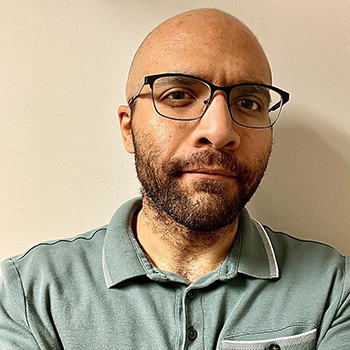
A perk of becoming Jewish as an adult is choosing your own Jewish name. To some people, the idea of taking on an additional name sounds exciting and fun! To others, it may seem daunting. For still others, it may be a little of both.
After all, choosing a Jewish name has big implications: It’s the name that will be forever used in Jewish religious services, including your conversion ceremony, b’nei mitzvah, wedding, etc., and if you have children, your name will be incorporated into their names, as well.
How should you go about it? Well, no one can tell you exactly how to do it or what name you should choose – but you can learn from the experiences and insight of others who have taken this path before you. Here, three Jews-by-choice – myself included – share how we decided upon the Jewish names we chose for ourselves. We hope our experiences can help guide you.
1. Consider names that are similar to your English name.
My Jewish name is Chaim Ezra. Though both names have deep meaning for me (more on that in a minute), I also chose it because Chaim sort of sounds like my English name, Chris, and Ezra sounds like my legal middle name, Estell.
2. Look for names that suit the person you are and want to be.
When I chose my Jewish names, I asked myself, “Does this name resonate with the person I am or the qualities I try to embody?”
Chaim has always been a very Jewish-sounding name to me (maybe it’s the ch sound?) – and it means “life,” which I believe is precious and should be lived to its absolute fullest.
Ezra means “helper,” and for as long as I can remember, I’ve wanted to help others in any way I could. Additionally, the biblical Ezra was a writer who reintroduced the Torah to Jerusalem. I relate to this as a Jewish writer who wants to reintroduce Torah in every capacity of my life, specifically righteous Jewish living through service to God and others.
3. Think about names that have special meaning to you.
My friend Sara Wolf Molnar, who became a bat mitzvah as an adult, connects her Jewish name Elisheva (which some people understand be a derivative of Elizabeth, “God is my Oath”) to both Judaism and to her childhood. She says:
“My father wanted me to be named Elizabeth, although my mom won with Sara. It felt like a name that wanted to be mine…There were fancier names, flashier ones, and I thought of them – but I had to be Elisheva. Because I always was.”
4. Reflect on names that reconnect you of loved ones you’ve lost.
My English middle name, Estell, was also the name of my father, z”l; in choosing Ezra as my Jewish middle name, I paid a small tribute to his memory.
Sara’s Hebrew name was influenced by a loved one, too. As a child, she spent a lot of time with her grandmother, a nurse who lived with a Jewish doctor and his family. The doctor’s mother-in-law, a woman named Bessie (short for Elizabeth) had a positive impact on Sara: “She was kind to me and treated me like her own grandchild. She bought me little things for school and played with me. I [still] remember her, 40 years later.”
Part of the reason she took on the name Elisheva was as means of paying tribute to a woman who affected her in such a profound way. “I took it ultimately to honor her, probably the first Jewish person I knew,” Sara says. “She was kind, open, and loving – everything I strive to be.”
5. Seek out names that symbolize your Jewish journey.
Tani Prell Epstein, a member of the Union for Reform Judaism’s 2018 JewV’Nation Fellowship, chose the Hebrew name Tikvah Shalom, words that means “hope” and “peace,” respectively. Like Sara, Tani’s connection to her grandparents partly inspired the name she chose:
“When I was 3 three years old, hope (tikvah) came in the form of my grandparents, who quite literally saved my life…My grandma taught me to love people deeply, to question the status quo, and to never be afraid to be different.”
Tani says she would have lost hope in religion had it not been for Judaism and learning about Jews’ eternal relationship with tikvah, from slavery in Egypt through the Holocaust and beyond. “The Jews have always overcome,” she says. “They have always protected, learned, and created. As a 12-year-old, the Jewish people gave me hope. I thought, ‘If they can do it, so can I.’”
6. Ultimately, choose Jewish names that are meaningful to you and make you feel connected to your Judaism.
Tani now continues to find tikvah in her relationship with her husband Charles, who she feels truly exemplifies what it means to be a Jew. She says:
“The first time I met him, he gave me hope that there are truly good people in the world. many of the things he has taught me he attributes to his Jewish upbringing. Tikkun olam (repairing the world) is a driving force behind everything he does. He learns constantly in hope of bettering himself and humanity. He has taught me to see outside of myself, to believe that the world is better because people are here, and that every moment is a gift.”
She also connects tikvah to her future:
“I want to start a family centered on Jewish beliefs and tradition. I think of the times when my Jewish name has and will be said: at my conversion ceremony, at my wedding, when our hopeful children have their b’nei mitzvah. These are all be moments that never would happen without tikvah. I want [my children] to grow up knowing that if you believe and fight for what is right, there will always be tikvah.”
There are many reasons for choosing one’s particular Jewish name. Whether it’s due to a family connection, resonance with a Jewish value, or another reason entirely, choosing your name is a unique and personal act and no matter which name you choose, let it be one that will resonate throughout your life and bring you joy.
Trying to come up with the perfect Jewish name for yourself? Check out our Jewish Baby Naming Tool to find hundreds of Jewish names and their meanings.


